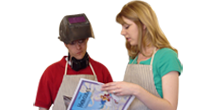AUCD Publications
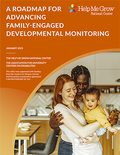
1/13/2023
A Roadmap for Advancing Family-Engaged Developmental Monitoring
The purpose of A Roadmap for Advancing Family-Engaged Developmental Monitoring is to introduce and describe family-engaged developmental monitoring (FEDM) as a key component of a framework for children's healthy development and family wellbeing that includes developmental promotion, FEDM, screening, referral, and receipt of services.
1/6/2022
UCEDD Tip Sheets
Tip Sheets are intended to provide guidance and share peer practices of specific aspects of UCEDD operations, grant management, and core grant application development. Tip sheets clarify requirements outlined in the DD Act, related federal regulations, and/or AIDD's Quality Review System processes as appropriate; and also share experiences and recommendations from network peers.
8/25/2021
2021 Report on UCEDD-University Relationships and Agreements
This new report explores the relationships between UCEDDS and their home university by analyzing responses to a fall 2020 survey on UCEDD-university relationships and shared Memorandums of Understanding (MOUs) or other official agreements. It explores commonalities and unique features of these relationships and offers some guidance for UCEDDs revisiting their agreements or relationships.

4/16/2021
Creating an Accessible Vaccine Experience for People with Disabilities and Older Adults
A coalition of aging and disability groups, including AUCD, partnered to develop a guide to making vaccination sites fully accessible to older adults and people with disabilities. The recommendations included in the guide address significant gaps in accessibility of vaccine administration sites and can go a long way toward increasing vaccination rates in these vulnerable populations.
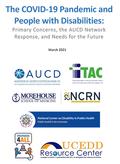
3/18/2021
The COVID-19 Pandemic and People with Disabilities: Primary Concerns, the AUCD Network Response, and Needs for the Future
While the COVID-19 pandemic has impacted how individuals worldwide live, work, communicate, and receive medical care and education, it has further illustrated the disproportionate gaps that exist for people with disabilities to receive these same resources and services necessary for survival and quality of life. The Association of University Centers on Disabilities (AUCD) has identified, responded to, advocated for, and addressed the needs of people with disabilities throughout the pandemic.

11/23/2020
Frequently Asked Questions: COVID-19 Vaccine Distribution Considerations for the Disability Community
An FAQ to support state and local disability leaders advocate for the role of individuals with disabilities in the allocation and distribution plans for a COVID-19 vaccine. Includes information on the approval, manufacturing, allocation, and distribution processes for a COVID-19 vaccine, AUCD network vaccine resources, and links to addition federal, state, and local public health resources.
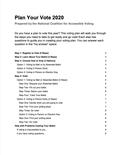
9/23/2020
Plan Your Vote 2020
Voting is one of the most important rights of a US citizen. It allows people to choose leaders they feel will best represent their needs on the local, state, and federal levels. You can make real change by being an educated voter in your community. Use this Plain Language guide prepared by the National Coalition for Accessible Voting to Plan Your Vote in the 2020 Elections.

5/4/2020
Frequently Asked Questions (FAQ) 2.0 Re: COVID-19
You can find the Frequently Asked Questions (FAQ) Re: COVID-19 on the UCEDD Resource Center. Information in this Frequently Asked Question document is here to help you continue UCEDD core functions during the COVID-19 pandemic. AUCD and the UCEDD Resource Center will continue to update this document as needed.
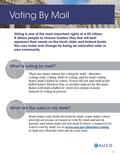
5/1/2020
Voting By Mail
Voting is one of the most important rights of a US citizen. It allows people to choose leaders they feel will best represent their needs on the local, state, and federal levels. You can make real change by being an educated voter in your community.

4/28/2020
Frequently Asked Questions (FAQ) Re: COVID-19
Information in this Frequently Asked Question document is here to help you continue UCEDD core functions during the COVID-19 pandemic. AUCD and the UCEDD Resource Center will continue to update this document as needed.

1/31/2020
Increasing Trainee Survey Responses: Best Practice Methods for Obtaining High Response Rates from Trainees
Obtaining high trainee response rates to the LEND and UCEDD 1, 5, and 10 year surveys can be difficult for programs to get. To assist Centers in potentially increasing their response rates, AUCD interviewed training directors and former trainees from the 5 UCEDDs and/or LENDs with the consistently highest response rates to understand their strategies for surveying former trainees. This report describes AUCD's interviews and the practices these Centers have found to be successful.
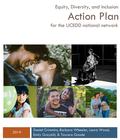
1/24/2020
Equity, Diversity, and Inclusion Action Plan for the UCEDD National Network
The UCEDD network has the capacity to reduce disparities, improve outcomes, and promote a more equitable, diverse, and inclusive society for individuals with developmental disabilities and their families from historically underserved groups. This Action Plan identifies four areas of focus with objectives and action steps for network members to address: (1) workforce diversity, (2) cultural and linguistic competence, (3) state/local impact, and (4) crosscutting considerations that apply to all efforts.

1/23/2020
AUCD Annual Report 2019
AUCD is pleased to present our annual report for FY 2019. Learn about the individuals and initiatives that make AUCD such a force for people with disabilities and their families around the world.
11/19/2019
Innovations and Best Practices in Medicaid Managed Long-Term Services and Supports (MLTSS)
Two new documents from AUCD
The movement to MLTSS is gaining momentum across states and new and pioneering models are emerging. With this shift, stakeholders need to understand how these changes can impact service delivery and also understand that they can help states design quality MLTSS programs.
Two new documents written by Sarah Swanson of the Munroe Meyer Institute and published by AUCD provide specific examples of new programs developed through this systems change, highlight states that are implementing quality programming in their LTSS programs, and outline ways that disability stakeholders can be involved.

10/21/2019
UCEDD Network Engagement in ABLE Act Implementation Efforts
A wide range of UCEDDs have engaged in the implementation of the ABLE Act at the national, state, and local levels. UCEDDs are both developing new initiatives and resources specific to the ABLE Act and incorporating content on the ABLE Act into existing programs and projects.
_300w_sm.jpg)
9/3/2019
The Transformation to Competitive Employment Act
The Transformation to Competitive Employment Act clearly supports that vision by phasing out Section 14(c) of the Fair Labor Standards Act of 1938 and thoughtfully provides the resources necessary to allow for the transition to a competitive integrated employment business model. This bill represents tangible, life-changing opportunities for people with disabilities and their families.

8/12/2019
Congressional Recess Guide
A Congressional Recess is an opportunity for you to be able actually to meet with your members in your community when they are less busy. A recess is a good time to talk to members or their staff.
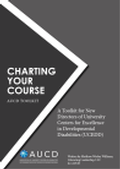
3/6/2019
Charting Your Course AUCD Toolkit
A Toolkit for New Directors of University Centers for Excellence in Developmental Disabilities (UCEDD)
This toolkit contains a series of concepts and exercises designed to help early stage UCEDD directors begin well in their roles. This toolkit is a complementary resource to the AUCD's UCEDD Resource Center (URC). The URC contains a treasure trove of resources for UCEDD Directors to learn and grow in their leadership. Most of the available resources provide guidance on many of the technical and regulatory issues related to the work of the UCEDD. This toolkit is designed to provide concepts, frameworks and tools that build that capacity of UCEDD directors for organizational and systems leadership.
1/30/2019
Education and Advocacy: Know the Difference
A guide for trainees
As experts with lived experience and knowledge gained from training, research, and direct practice, we have a responsibility to engage in policy education and systems change. It is important to understand the ways you can engage as a representative of a federally-funded training program and which actions should be reserved to your roles as private citizen.
1/24/2019
Keeping All Students Safe Act
America's schools should be places where every child is safe and protected. The practice of seclusion and restraint in schools exposes students to physical, developmental and emotional harm.
11/1/2018
State Level Policy Advocacy 101
Advocating for inclusive disability policy at the state and local levels is a great way to make positive change in your community. However, all advocacy is not created equal. It is important to advocate in the most useful, impactful way possible and in a way that will create change. This page will help guide you through things to consider when taking part in effective advocacy.
10/5/2018
Tuesdays With Liz Flyer
This one-page printable flyer for the AUCD "Tuesdays with Liz" YouTube show is intended for sharing on bulletin boards, in handouts, and anywhere people gather who would benefit from learning more about disability policy in a short, user-friendly format.
10/1/2018
Public Charge Policy Update
The Department of Homeland Security (DHS) posted a new draft of the "public charge" policy on September 22. Public charge is a term used by U.S. immigration officials to refer to a person who is considered primarily dependent on the government for subsistence.
10/1/2018
Sample Phone Script
For Calling Members of Congress
Sometimes calling your Congressmember can be scary. You may not know what to say or how to say it. This script from AUCD can be used for any concerns you may have; just fill in the blanks.
8/1/2018
Contacting Congress
A How-To
This short, easy-to-read document from AUCD explains the What, Why, Who, and How of Contacting Congress.
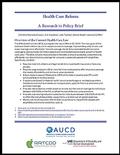
11/16/2017
Health Care Reform: A Research to Policy Brief
Written by: Christine Marcella Grosso, Kim Musheno, John Tschida, Denise Rozell, Adriane Griffen, AUCD
The Affordable Care Act (ACA) was signed into law on March 23, 2010. The main goals of this landmark health reform law are to: expand access to coverage, improve the quality of care, and make coverage more affordable. Since its passage, the ACA has extended health insurance coverage to approximately 20 million people and contributed toward slower growth of health care costs. The ACA contains many provisions intended to ensure accessible, comprehensive, affordable, non-discriminatory coverage for consumers, especially people with disabilities.
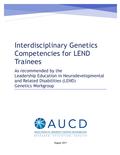
10/3/2017
Interdisciplinary Genetics Competencies for LEND Trainees
As recommended by the Leadership Education in Neurodevelopmental and Related Disabilities (LEND) Genetics Workgroup
The purpose of this document is to serve as resource for LEND programs for those programs desiring to strengthen their genetics content. It is not intended to serve as a mandate or requirement, but rather to provide specific guidance in achieving basic and advanced competencies in genetics.
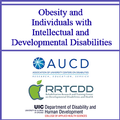
9/26/2017
Obesity and Individuals with Intellectual and Developmental Disabilities
A Research to Policy Brief
Obesity is an increasingly common condition that is characterized by an increase in the number and size of fat cells in the body. Obesity rates are a concern for the general population, but research findings consistently report even higher rates of obesity among individuals with intellectual and developmental disabilities (IDD). The Centers for Disease Control and Prevention report approximately 35% of the general population is obese, while the rate of obesity among adults with IDD is as high as 58.5% in the United States. The consequences of obesity predispose adults with IDD to a greater risk of secondary health conditions that can impair their health status and quality of life.

9/20/2017
2017 AUCD Network Report
AUCD is fortunate to have such a committed network of experts and advocates who are engaged in the critical work of our diverse network. In this, our 2017 annual report, we've highlighted several of those individuals from all branches of the AUCD membership to reflect the many different ways they are accomplishing extraordinary things in their everyday work. They reflect the power and importance of lifting your voice. We know you will be as impressed as we are with their stories, and we invite you to join us as we work to advance the well-being of all people with disabilities and their families.
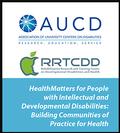
11/14/2016
HealthMatters for People with Intellectual and Developmental Disabilities: Building Communities of Practice for Health
A Research to Policy Brief from AUCD and UIC's RRTCDD
The emergence of accessible health promotion initiatives for people with intellectual and developmental disabilities (IDD) over the past 20 years demonstrates great promise for improving their health status. However, people with IDD continue to experience numerous age-related health issues and often lack control over environments and practices that impact their health. Determining successful scale-up processes of "what works" is critical in being able to achieve the goal of improved lives for the greatest number of people.
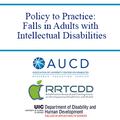
8/3/2016
Policy to Practice: Falls in Adults with Intellectual Disabilities
One out of every three adults aged 65 years or older in the general population falls at least once each year. For adults with intellectual disability (ID), the prevalence of falls is even higher with studies estimating a fall rate ranging from between 29% to 70%. Falls are a major cause of serious injury and hospitalization, and an important public health concern. Using baseline data from the Longitudinal Health and Intellectual Disability Study, we examined the prevalence of falls and potential risk factors for falls in adults with ID.
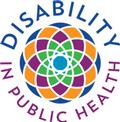
6/23/2016
Including People with Disabilities: Public Health Workforce Competencies
The Association of University Centers on Disabilities (AUCD) is pleased to announce the release of the Including People with Disabilities: Public Health Workforce Competencies. These Competencies outline recent advances in knowledge and practice skills that public health professionals need to include people with disabilities in the core public health functions - Assessment, Policy Development and Assurance. The Competencies have been developed by a national committee comprised of disability and public health experts.
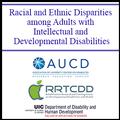
1/5/2016
Racial and Ethnic Disparities among Adults with Intellectual and Developmental Disabilities
This study investigated the extent of racial and ethnic disparities in the health of adults with intellectual and developmental disabilities. Findings suggest that Black and Latino adults with intellectual and developmental disabilities have markedly worse health status than both their white counterparts with intellectual and developmental disabilities, and nondisabled adults within their racial and ethnic groups.

7/23/2015
Call to Action on Community Living from AUCD & AAIDD
As we approach the 25th anniversary of the Americans with Disabilities Act, one of the continued areas of discussion about services and supports for people with intellectual and developmental disabilities has been around residential supports. In this joint paper, AUCD and AAIDD provide an accessible summary of the research from the past 30 years and recommendations for residential services.
9/30/2014
UCEDD Promising Practice Briefs
Promising Practice Briefs are intended to highlight projects of excellence with a goal of offering a program model from which University Centers for Excellence in Developmental Disabilities (UCEDDs) can glean inspiration for new activities and promising practices to augment their own work. A promising UCEDD practice may be a research or evaluation project, policy analysis, data assessment, outreach initiative, or awareness effort. It may provide a direct service or a supported opportunity to people with a developmental disability, indirect support to family and community caregivers, or interdisciplinary training for students, fellows, professionals, and policymakers. It may involve leadership development, community work, or clinical practice.

7/29/2014
Grant Writing and Grant Management Toolkit For Self-Advocates
AUCD created this toolkit based on feedback from self-advocates who participated in these Self-Advocacy Organizational Development Grants, who expressed interest in writing grant applications. This toolkit is designed to help more self-advocacy organizations apply for grant in the future.
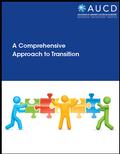
4/10/2014
A Comprehensive Approach to Transition
Geared for individuals with disabilities, this paper was produced by members of the Association of University Centers on Disabilities (AUCD) because they want to help people work together to support the self-determined transition of youth to adulthood and community life.
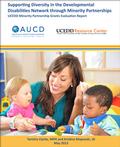
12/16/2013
Supporting Diversity in the Developmental Disabilities Network through Minority Partnerships
UCEDD Minority Partnership Grants Evaluation Report
This report was developed to guide UCEDDs and Minority Serving Institutions (MSIs) by revealing strategies, highlighting accomplishments and outcomes of the projects, and identifying lessons learned by grantees as well as provide recommendations for UCEDDs, AIDD, and AUCD. The expectation is that by informing the network, leadership from all Centers will seek out similar opportunities to create academic and clinical programs for diverse students and the individuals they will go on to serve.
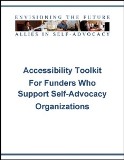
12/4/2013
Accessibility Toolkit For Funders Who Support Self-Advocacy Organizations
This toolkit is designed to help funders who are interested in funding self-advocates and self-advocacy organizations to have a better understanding of how to work best with people with disabilities, and make sure their needs are met throughout the grant process. This toolkit is the result of needs that were identified by the Association of University Centers on Disabilities (AUCD) while providing technical assistance for a self-advocacy pilot grant project that was funded by the Administration on Intellectual and Developmental Disabilities (AIDD).

10/30/2013
Achieving Cultural and Linguistic Competence in Information Dissemination Activities
When creating a new publication or posting information, there are several aspects to keep in mind during the development phase to ensure the publication fully takes into consideration cultural and linguistic differences and representations, regardless of the methods by which that publication or piece of information is being produced and disseminated. The following guidelines, developed by AUCD in 2013, are not intended to be either requirements or a checklist that guarantees a product or piece of information is appropriate to all audiences. Rather, we hope that this document will serve as a point of reference and stimulate careful consideration for anyone writing or producing information for any audience.

10/30/2013
Considerations for Culturally and Linguistically Competent Presentations
When preparing a presentation for any audience, there are several considerations to keep in mind to ensure the presentation is fully takes into consideration cultural and linguistic differences of the audience and information being presented. The following guidelines, developed by AUCD in 2013, are not intended to be either requirements or a checklist that guarantees a product or piece of information is appropriate to all audiences. Rather, we hope that this document will serve as a point of reference and stimulate careful consideration for anyone preparing a presentation.

10/20/2013
Ensuring Cultural and Linguistic Competence in Meeting Planning and Activities
When planning a meeting, there are several aspects to keep in mind to ensure the activity fully takes into consideration potential cultural and linguistic differences of attendees and participants. These guidelines, developed by AUCD in 2013, are not intended to be either requirements or a checklist that guarantees an event or activity is fully welcoming and appropriate to attendees of all backgrounds. Rather, we hope that this document will serve as a point of reference and stimulate careful consideration for anyone planning an event or activity of any size.
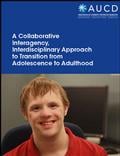
5/24/2013
A Collaborative Interagency, Interdisciplinary Approach to Transition from Adolescence to Adulthood
This paper promotes four core concepts that are essential to the development and implementation of effective transition plans and process: (1) Self-determination should be the foundation for transition planning; (2) Transition should be viewed through a cultural lens; (3) Interagency collaboration is essential to effective transition (4) Transition planning should include all the perspectives, disciplines, and organizations that will impact the transitioning student.
This paper was written for and by directors and staff UCEDDs and LENDs with the aim of promoting a dialogue among key stakeholders and facilitating their engagement in pursuing a more comprehensive, coordinated, supportive, and successful transition process for youth with disabilities from adolescence to young adulthood. See AUCD's press release for additional information.

4/1/2013
LEND Accomplishments Under CAAI, 2008-2012 (infographic)
The nation's 43 LEND programs, part of MCHB's Combating Autism Act Initiative (CAAI), are tasked with improving the lives of children who have or are at risk for autism and other developmental disabilities in part by promoting early screening, diagnostic evaluations, and interventions. For this infographic, AUCD examined data from the past four years of LEND CAAI activities in training the next generation or providers, training current professionals, screening and diagnosis of children, and disseminating publications and products.
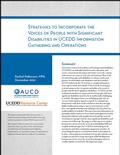
3/4/2013
Strategies to Incorporate the Voices of People with Significant Disabilities in UCEDD Information Gathering and Operations
This report provides tools and strategies on how to better attune to the viewpoints of people with most significant disabilities. The focus of the report is on the inclusion of people who have traditionally faced high barriers to participation, particularly given intellectual, communication, or behavioral challenges. Strategies for inclusion that focus on flexibility and finding new opportunities to listen, as well as the use of proxy respondents, are included.
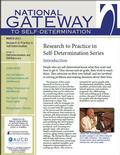
2/1/2013
Research to Practice in Self-Determination Series
The Research to Practice in Self-Determination Series describes key issues in the field of developmental disabilities that can be enhanced by considering efforts to promote self-determination. Seven issues will be produced, each focusing on a specific topic: self-advocacy, health, employment, community services, aging, family support, and siblings.
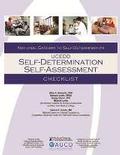
12/12/2012
UCEDD Self-Determination Self-Assessment Checklist
The UCEDD Self-Determination Self-Assessment Checklist provides the UCEDD with a straightforward tool and process to determine the degree to which its policies, practices, and personnel, at a given point in time, are promoting self-determination for people with intellectual and developmental disabilities and their families.

11/8/2012
Envisioning the Future: Allies in Self-Advocacy Final Report
In collaboration with the Developmental Disabilities network, self-advocates, and allies, a series of nine regional summits across the country were held in 2011-2012 to promote collaboration, planning, and recommendations at the state and national levels. This report summarizes the goals of the Self-Advocacy Summit Initiative and describes the planning, implementation, findings, outcomes, evaluation, and feedback of the events.
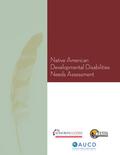
11/1/2012
Native American Developmental Disabilities Needs Assessment
This report provides information about the availability of services and support for individuals with developmental disabilities (DD) and their families, the needs of DD tribal members and their families, and tribal members' familiarity and contact with the DD Network agencies.
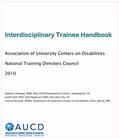
8/21/2012
Trainee Handbook
The AUCD Trainee Handbook is intended to be used to support AUCD network trainees with a variety of learning goals. Created by AUCD and members of the National Training Directors Council, this document will provide a consistent approach to accessing information about the network, its history, our federal partners, and the rich resources available to trainees. This handbook is considered a supplement to Trainee Handbooks provided at local programs.
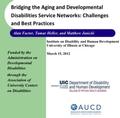
4/25/2012
Bridging the Aging and Developmental Disabilities Service Networks: Challenges and Best Practices
This report identifies policy and service delivery issues pertaining to older adults with developmental disabilities and their families and recommends opportunities to enhance collaboration among the aging, disability, and long-term care networks.
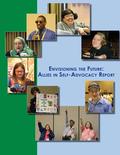
11/21/2011
Envisioning the Future: Allies in Self Advocacy Report
In collaboration with the Developmental Disabilities network, self-advocates, and allies, a series of five regional summits across the country were held in the spring of 2011 to promote collaboration, planning, and recommendations at the state and national levels. This report summarizes the goals of the Self-Advocacy Summit Initiative and describes the planning, implementation, findings, outcomes, evaluation, and feedback of the events.
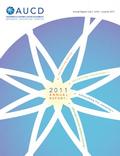
11/1/2011
2011 AUCD Network Report
AUCD stands with its national network of member centers to promote initiatives that train leaders, aggregate critical resources, and disseminate practices and information that support people with disabilities-all so that they can live self-determined lives. Through partnerships and the coordinated efforts of professionals, family members, and self-advocates, AUCD has made a marked difference in the lives of people with disabilities and their families in 2011.
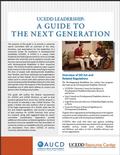
9/30/2011
UCEDD Leadership: A Guide to the Next Generation
This guide provides a university search committee with an overview of the roles, functions, and expectations for the leadership of a UCEDD. It outlines the federal requirements for UCEDDs and UCEDD Directors, as well as best practices gleaned from across the UCEDD network in the process of selecting a new UCEDD Director. Appendices provide additional information on federal legislation, technical assistance resources available from AUCD, and Director job descriptions from other UCEDDs of various university administrative homes.
7/26/2011
Electronic Tool Kit of Training Resources for Medical, Dental, and Nursing Students
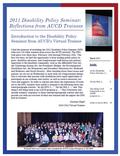
5/3/2011
Disability Policy Seminar 2011: Reflections from AUCD Trainees
Over 110 AUCD trainees attended the 2011 Disability Policy Seminar. In order to capture the experience, the 2011 AUCD Virtual Trainee Suzanne Engel asked trainees in attendance to share their thoughts by responding to three sentence-starters: "At the DPS, I...," "On the Hill, I...," and "One thing I will bring back to my program is..." This publication includes trainees' responses to these sentence-starters and provides an overview of what was learned and the impact the DPS had on trainees.
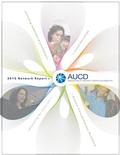
12/1/2010
2010 AUCD Network Report
This report provides an overview of the activities of the membership of the Association of University Centers on Disabilities (AUCD) and of the AUCD Central Office over the fiscal year, covering July 1, 2009 to June 30, 2010. Despite the economic challenges that we all face nationally and in our individual states, the network had a productive and noteworthy year. Interdisciplinary training, research, and technical assistance activities grew, even in this challenging environment.
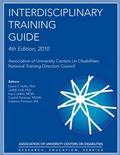
11/1/2010
Interdisciplinary Training Guide (4th Ed)
While the concept of Interdisciplinary Training may appear reasonably straightforward, the operational mechanics of developing and running an Interdisciplinary Training Program can be quite challenging. This Guide, like those before it, provides a framework from which flexible and variable programs can operate to train future leaders in the field of developmental disabilities.
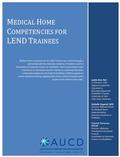
10/30/2010
Medical Home Competencies for LEND Trainees
The ultimate goal of a medical home is to ensure better coordination of care, via participation of an interdisciplinary team, within the medical home. It is essential for LEND trainees to understand the core tenets of medical home and how they apply to their respective fields of expertise to ensure high-quality work as part of the medical home team.
1/5/2010
Tool Kit of Pre-service Curricular Materials
11/20/2009
2009 AUCD Network Report with Insert
This report provides data and information on work performed in FY2009 and the impact of that work on the lives of people with disabilities by AUCD and the three national networks it supports and represents.
12/9/2008
2008 Network Report
2/18/2008
AUCDigest

11/1/2007
2007 Network Report
The Association of University Centers on Disabilities (AUCD) is a membership organization comprised of three national networks of interdisciplinary, university-based Centers dedicated to research, education, leadership training, policy development, and direct service for people with disabilities, and related centers and entities. This report provides data and information on work performed in FY2007 and the impact of that work on the lives of people with disabilities by AUCD and the three national networks it supports and represents.
10/30/2007
Adult Services in the AUCD Network
10/30/2007
Autism Services in the AUCD network
10/30/2007
Collaboration: UCEDDs, LENDs, and State MR/DD Agencies
10/30/2007
Report on the AUCD Network: Autism, Adult Services, MR/DD Agency Sruvey
11/1/2006
Health Administration Competencies in LEND 2006
The subsequent pages provide activities, resources, and suggestions to build the skills of LEND Health Administration trainees. LEND programs are encouraged to use the following competencies for both their HA trainees and their non-HA trainees.
10/27/2006
Impact of the AUCD Network in FY2006
The Association of University Centers on Disabilities (AUCD) is a membership organization comprised of three national networks of interdisciplinary, university-based Centers dedicated to research, education, leadership training, policy development, and direct service for people with disabilities, and related centers and entities. This report provides data and information on work performed in FY2006 and the impact of that work on the lives of people with disabilities by AUCD and the three national networks it supports and represents.
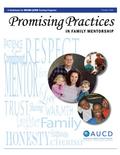
4/23/2006
Promising Practices in Family Mentorship
Created by Family Faculty in 2006, this Guidebook describes Family Mentorship activities in MCHB LEND programs.
3/1/2006
Consumer Advisory Committees: Recommendations for Meaningful Participation of Individuals with Disabilities and Families
The Association of University Centers on Disabilities (AUCD) and its Council on Community Advocacy (COCA) collaborated on a participatory action research project exploring meaningful participation and effectiveness of Consumer Advisory Committees (CACs) at University Centers for Excellence in Developmental Disabilities (UCEDDs).
6/1/2004
Organizational Cultural Competency Assessment (2004)
In the current environment, many contracts and grants are requiring documentation of activities concerning cultural competence and/or sensitivity, including self-assessments and training. Therefore, the purpose of the instrument is to assist organizations to assess their progress towards cultural competence, both at the organizational and individual level. Created by an AUCD workgroup in 2004.
2/28/2004
Health Administration in LEND 1987
A document created in 1987 by an AUCD (AAUAP) work group discussing the participation of the Health Administration discipline in training programs.
11/1/2001







